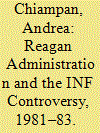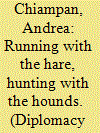| Srl | Item |
| 1 |
ID:
172492


|
|
|
|
|
| Summary/Abstract |
In re-evaluating the origins of Italian clandestine political violence groups in the early 1970s, this article sheds new light on overlapping processes of legitimation of violence that took place in that “transitional space” created by the 1968–69 social upheavals. Eschewing mono-causal explanations, this article points attention to how violence was legitimized at different levels: in the interaction between the movement and the “protest policing”; in the competing memories of the Resistenza that generated opposing extremes; and at an international/transnational level, where the Cold War and the mythology of the decolonization movements framed and inspired the choices of Italians terrorists.
|
|
|
|
|
|
|
|
|
|
|
|
|
|
|
|
| 2 |
ID:
174951


|
|
|
|
|
| Summary/Abstract |
In the fall of 1983, the international tension that characterized the Cold War reached new heights. Since the election of President Ronald W. Reagan, Soviet and American leaders had not yet held a summit meeting amid reciprocal accusations. In September, the Soviets shot down a commercial airline flight (KAL 007) that had strayed off course over Soviet airspace killing 269 people, including Congressman Larry McDonald (D-GA).1 In November, the North Atlantic Treaty Organization (NATO) military exercise codenamed “Able Archer” allegedly induced the Soviets to believe that war was imminent. This was perhaps an exaggeration, but in the aftermath of what came to be called the “war scare” many U.S. officials were persuaded that the world had—like in October 1962—come again close to a nuclear confrontation.2 The anti nuclear movement that had gathered unprecedented popular support throughout Western Europe and the United States did not need “Able Archer” to be reminded of the ever-present specter of a nuclear holocaust so graphically depicted in the iconic 1983 film The Day After.
|
|
|
|
|
|
|
|
|
|
|
|
|
|
|
|
| 3 |
ID:
126360


|
|
|
|
|
| Publication |
2013.
|
| Summary/Abstract |
This article reconsiders the negotiations between the United States and Britain at the outbreak of the 1982 Falklands War. The Reagan Administration did not support Britain, its staunchest NATO ally, and on the contrary assumed an even-handed position that recognised Argentina as a key ally as much as Britain. Not only did American mediation fail; it also caused a major crisis in Anglo-American relations. The underlying reason for the American decision was the obsessive importance that the Administration attached to fighting communism in Latin America after establishing covert co-operation with the Argentinian military junta in 1981.
|
|
|
|
|
|
|
|
|
|
|
|
|
|
|
|